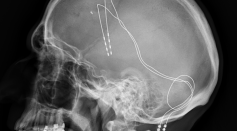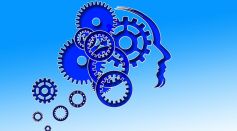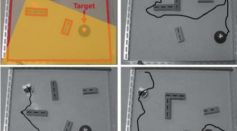Tags: Brain

Sleep Quality of Older Adults Could Reflect to Neural Connection Status and Cognitive Functions

Sildenafil Identified as a Candidate Drug Against Alzheimer's Disease: Lab Experiments Showed Viagra Reduced Risk of Dementia

Amyotrophic Lateral Sclerosis Medicine: Study Suggests to Focus on the Brain Not Just Spinal Cord for ALS Therapy

Can Neuralink Chip Be Removed? Experts Say You Might Want to Think Through It Before Doing That

Is Football Bad for Your Brain? MRI Scans Reveal Lesions on White Matter Linked to Years of Repetitive Head Injuries from Playing

Breakthrough Study on a Living Slice of Brain Will Help Develop New Drugs, Treatments for Fatal Diseases

Depression Treatment Found? Studies Eye Deep Brain Stimulation That Tweak Cerebral Circuits As Possible Cure

Hearing Loss Possible Warning Sign of Having Dementia, Study Says

Tool Use, Language Skills Both Rely on the Same Neurological Resources; New Study Suggests Practicing One Improves the Other

Fathers With High Attachment to Their Children Have Larger Hypothalamus in Brain

Israel Scientists Alter Brains Leading to the Discovery of How It Triggers, Resolves Psychosomatic Illness

COVID-19 Found to Infect Neurons Through Nose, Passing Blood Barrier and Causing Brain Fogs

Brain's MC3R Receptor Responsible for Increased Height and Early Puberty, Study Says
World Stroke Day 2021 Celebrates New Treatments, Healthy Lifestyle to Avoid the Second Leading Cause of Death

Japan Develops 'Thinking Robot' Through Physical Reservoir Computing; Learns and Moves by Artifical Neurons

TikTok is Bad For Your Brain: Constant Social Media Streaming Narrows Collective Attention Span, Adversely Affects Mental Health
Spatial Learning Impairment Observed from Deep Space Radiation-Exposed Mice, Affects Male Subjects Than Female
Human Brain's Size Decreased 3,000 Years Ago; Changes Linked to Ant Society

Discover The 'Sweet Spot' for Total Sleep to Maintain Cognitive Performance, Avoid Alzheimer's Disease

World Experts Meet in Colombia for International Neuroscience Congress
Most Popular

Dark Matter Explained: What We Know, What We Don't, and How It Shapes Cosmic Structure

Ocean Acidification, Marine pH Change, and CO2 Absorption: How Coral Reef Damage and Shellfish and Plankton Impacts Threaten Marine Life

Memory and Learning: How the Brain Stores, Retrieves, and Forgets Information

Water, Carbon, and Nitrogen Cycles: How Biogeochemical Cycles Sustain Earth's Ecosystems





